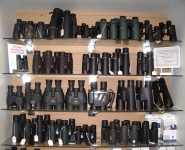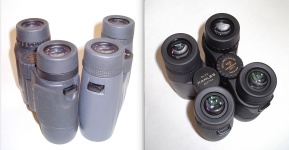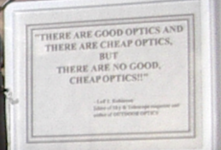WJC
Well-known member
For almost 50 years, I have done the best I could to save people from themselves—relative to consumer optics—through my binocular books, ATMJ, magazine articles, and lectures. Further, I have promised myself I would do the best I could to help with the misinformation that abounds on the Internet.
I never cease to be amazed that so many people who beg to learn more about optics and binoculars and who seek their answers on binocular forums instead of forums dedicated to universities and optical engineering.
Occasionally, when I have asked why, I am greeted with, “I can’t understand all that stuff.” This tells me that those observers are not nearly as interested in learning as they are in pontificating on what they have been speculating about. This puts them on an intellectually dangerous road.
“The enemy of knowledge in not ignorance; it is the illusion of knowledge.” — Stephen Hawking
and
“Any fool can know. The point is to understand.” — Albert Einstein
Just think of how high the bar of optical understanding could be raised if those last two quotes from two of the 20th Century’s greatest minds could get a little traction.
Some people want to talk about curvature of field when what they are actually commenting on is clinical distortion. Some talk about an aberration that engineers at their favorite binocular company “refuse” to address, oblivious to the fact that aberrations do not occur in a vacuum and that correcting one could adversely affect 2 or 3 others. But, of course, that would fit well into their pre-school world view of things.
So, I guess things will continue as they have for decades with the most ludicrous “facts” continuing to flourish unabated.
I think anyone reviewing this thread will readily admit that there are myriad cases of individuals who—for years—have owned some of the finest binoculars in the world and who seem dedicated to endlessly ... UPGRADING those binoculars, even though it can often be scientifically and medically proven that the eye/brain combination cannot actually SEE the difference. Oh yes, the view may be more pleasing (to that observer). But reality, being what it is, might lay the credit at the feet of any number of corrected aberrations or physical attributes and not the problem/aberration/condition the observer is extolling.
While the previous may be a relief for me, it is not why I created the thread. I created it to deal with mistakes, not in aberrations, but in similar misunderstandings relative to the industry.
Recently, I saw a thread on Swarovski and Kahles and I think one person said they were the same. If that is so, what does it say about this great company that has earned the top shelf in my optics shop. (see attached)
I had 11 models of Swarovski in stock, I sold enough to earn the crystal Habicht from the company and they knew I really cared. (see attached) However, I always cared more for the truth than hype. (see attached) My detractors said I couldn’t make any money doing things my way. I just laughed all the way to the bank.
Below is an image of an 8x32 Kahles and an 8x32 Celestron Noble. ‘Notice the many similarities? (see attached) Notice also that the Celestron says “MADE in Japan” while the Kahles just says “Austria.” The Kahles box did say, “Made in Austria.” And it was ... the BOX I mean!
The Kahles, which came from the same plant in Japan cost $319 more in 1995 (if I remember correctly). So many people who visit binocular forums seem to have a penchant for seeing if they can waste more money than their neighbor.
Both of these binoculars were very good instruments. But if you were into bragging rights in a big way, the Kahles would have been a much better purchase.
“The most hated man is the one who tells the truth.” — Plato
Bill
I never cease to be amazed that so many people who beg to learn more about optics and binoculars and who seek their answers on binocular forums instead of forums dedicated to universities and optical engineering.
Occasionally, when I have asked why, I am greeted with, “I can’t understand all that stuff.” This tells me that those observers are not nearly as interested in learning as they are in pontificating on what they have been speculating about. This puts them on an intellectually dangerous road.
“The enemy of knowledge in not ignorance; it is the illusion of knowledge.” — Stephen Hawking
and
“Any fool can know. The point is to understand.” — Albert Einstein
Just think of how high the bar of optical understanding could be raised if those last two quotes from two of the 20th Century’s greatest minds could get a little traction.
Some people want to talk about curvature of field when what they are actually commenting on is clinical distortion. Some talk about an aberration that engineers at their favorite binocular company “refuse” to address, oblivious to the fact that aberrations do not occur in a vacuum and that correcting one could adversely affect 2 or 3 others. But, of course, that would fit well into their pre-school world view of things.
So, I guess things will continue as they have for decades with the most ludicrous “facts” continuing to flourish unabated.
I think anyone reviewing this thread will readily admit that there are myriad cases of individuals who—for years—have owned some of the finest binoculars in the world and who seem dedicated to endlessly ... UPGRADING those binoculars, even though it can often be scientifically and medically proven that the eye/brain combination cannot actually SEE the difference. Oh yes, the view may be more pleasing (to that observer). But reality, being what it is, might lay the credit at the feet of any number of corrected aberrations or physical attributes and not the problem/aberration/condition the observer is extolling.
While the previous may be a relief for me, it is not why I created the thread. I created it to deal with mistakes, not in aberrations, but in similar misunderstandings relative to the industry.
Recently, I saw a thread on Swarovski and Kahles and I think one person said they were the same. If that is so, what does it say about this great company that has earned the top shelf in my optics shop. (see attached)
I had 11 models of Swarovski in stock, I sold enough to earn the crystal Habicht from the company and they knew I really cared. (see attached) However, I always cared more for the truth than hype. (see attached) My detractors said I couldn’t make any money doing things my way. I just laughed all the way to the bank.
Below is an image of an 8x32 Kahles and an 8x32 Celestron Noble. ‘Notice the many similarities? (see attached) Notice also that the Celestron says “MADE in Japan” while the Kahles just says “Austria.” The Kahles box did say, “Made in Austria.” And it was ... the BOX I mean!
The Kahles, which came from the same plant in Japan cost $319 more in 1995 (if I remember correctly). So many people who visit binocular forums seem to have a penchant for seeing if they can waste more money than their neighbor.
Both of these binoculars were very good instruments. But if you were into bragging rights in a big way, the Kahles would have been a much better purchase.
“The most hated man is the one who tells the truth.” — Plato
Bill
Attachments
Last edited:















